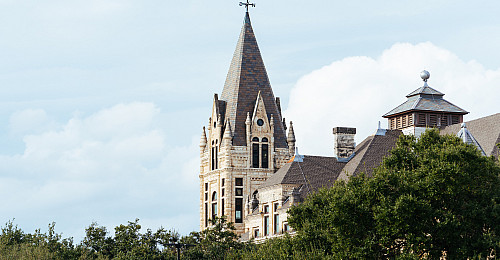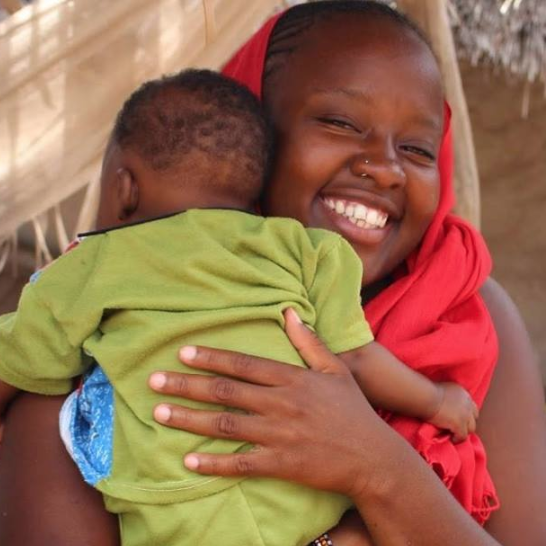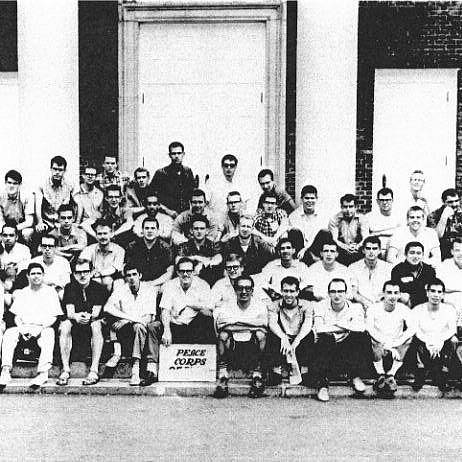News
Just Say Yes
Accounting major Erica Hogue Gannon ’00 reminisces about serving with the Peace Corps.
October 29, 2019
October 29, 2019
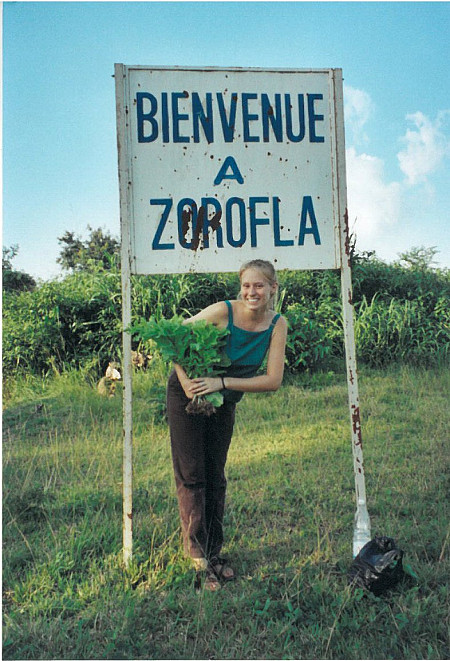
Erica Hogue (now Gannon) ’00 was in the midst of a long day of job interviews at Arthur Andersen, the (now-infamous) accounting behemoth that once provided auditing, tax-filing services, and financial consulting to large corporations. As an accounting major from Southwestern, Hogue was vying for an entry-level position that would likely help her achieve her master’s degree or else her licensure as a certified public accountant. Of course, she would inevitably be consigned to stressful and thankless long hours of grunt work at the firm, too—a future that didn’t exactly inspire enthusiasm.
So as she answered the hiring committee’s question, the soon-to-be graduate was up front about her alternative plans: “I’m not. I’m just interviewing with you and the Peace Corps.”
The unbreakable Erica Hogue
Arthur Andersen offered her the position at the end of the day. And given her résumé, that comes as no surprise: the young Southwestern grad had developed a strong accounting background in rigorous classes with professors such as A. J. Senchak and Fred Sellers, and she’d gained valuable skills through volunteering with Student Foundation, Phonathon, and her sorority, Delta Delta Delta.
But Gannon didn’t want to work at a desk job for the next 40 years; she wanted to “do something internationally minded first or in addition,” like so many graduates of liberal-arts colleges. She knew that volunteering with the Peace Corps would sharpen her language skills, and she looked forward to honing those coveted problem-solving abilities that she’d cultivated at Southwestern but could develop even further by living in a foreign culture with limited resources and technology. Moreover, the SU senior knew that as a government agency, the Peace Corps would provide her with training, medical care, and a support system while she was abroad, and she felt strongly that rather than just backpacking around Europe, she wanted to extend her education and work with an organization whose mission aligned with her personal values.
Of course, if she’s honest, the Southwestern alum admits that she also chose the Peace Corps because, she recalls, “somebody told me I couldn’t do it.” The same had occurred when she was considering an accounting major: friends had questioned why such a people person would choose a course of study often (even if erroneously) associated with number crunching, but Gannon found the work easy, liked that it was a marketable degree, and knew it would please her father, so she defied expectations by declaring the major. She thwarted incredulity about her plans to apply for the Peace Corps with similar conviction: “They said, ‘You’re a sorority girl. You wear makeup. You can’t go to Africa for two years! You can’t go to Africa and live without running water and electricity!’ And I was like, ‘Watch me!’”
(As one might expect, this refrain has become a household joke: family members will taunt, “Erica, you can’t wash those dishes …” She assures me that she never falls for such obvious cons.)
So after graduating from Southwestern, Gannon became one of the thousands of energetic volunteers who, since 1961, have begun stories with such phrases as, “Well, when I was in Africa …” Those were the days before volunteers had more say in where they would work, so the Peace Corps assigned the SU alum to the village of Zorofla in the République de Côte d’Ivoire, on the south coast of West Africa. There, she was tasked with promoting cultural exchange. At the tender age of 21, Gannon wasn’t sure what knowledge or skills she’d have to offer, but she soon learned that a lot could be accomplished just by having conversations. For example, some of the Ivoirians’ perceptions of Texas derived from the character of ruthless oil baron J. R. Ewing on the long-running American soap opera Dallas, so Gannon shared what life actually looks like in the Lone Star State. In turn, she learned about polygamy, death and the AIDS epidemic that was consuming the region, and child labor in the cocoa fields—lessons, she reflects, that were “important for me as a pretty sheltered person,” expanding her global perspective.
Given her major, Gannon was immediately assigned to a position working in business development. She consulted with her Ivoirian neighbors about what they needed and what they were able to contribute, and they decided that the village would benefit from building a school. Because the Peace Corps trains volunteers to make a sustainable impact so that their host communities can be self-sufficient long after they’ve served their 27 months, Gannon wrote grants to raise funds for the project, but the locals were responsible for gathering sand and water, making bricks, and constructing the building themselves. The work also required her to tap into her Southwestern-nurtured ability to problem-solve across fields: because her village lacked latrines, they would have to be built, so even without background or training, she sometimes had to apply her skills to the field of public health. Through it all, the Ivoirians treated Gannon like family, cheerleading her on even when she stumbled.
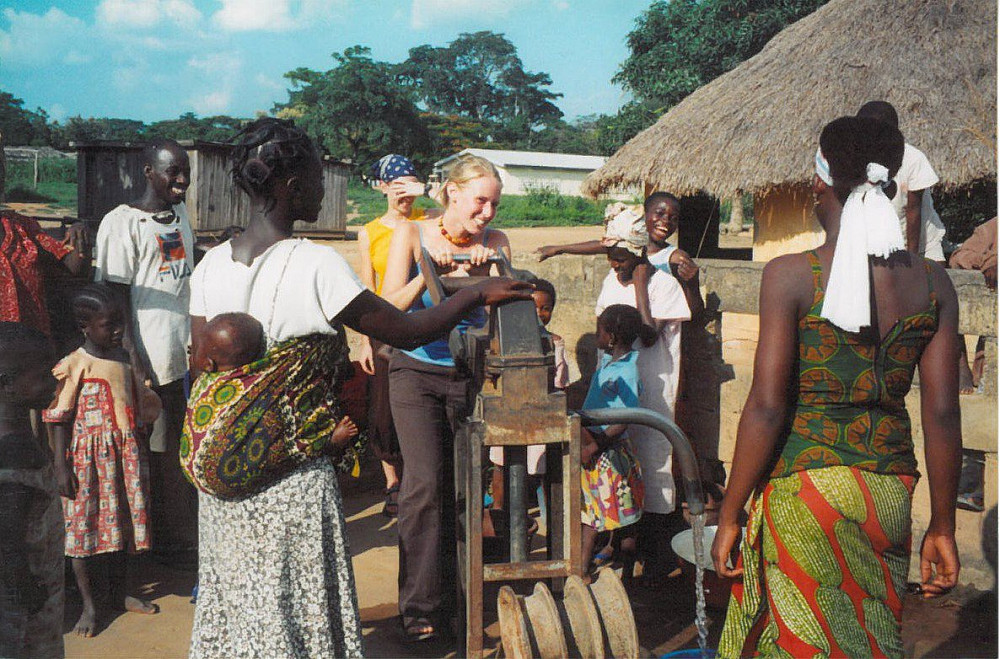
Failing forward
It wasn’t always so warm and fuzzy, of course. Gannon remembers that within her first three months, she thought she’d have to go home—as almost any Peace Corps volunteer will admit to thinking in those early days. She explains, for instance, that “in West African culture, your left hand is your ‘personal’ or ‘dirty’ hand, so you do nothing socially with your left hand.” However, Gannon is lefthanded, so she had to adjust how she ate meals and interacted with people. In addition to rapidly learning French, she had to gain proficiency in a tonal local language, but she couldn’t hear the differences in pitch. “I almost lost my mind!” she laughs. And on top of it all, she lived in a mud hut with no electricity and no running water, and in order to use the phone, check her (snail) mail, or have any connection to the outside world, she had to ride her bicycle to the city—“sort of that quintessential Peace Corps picture that you’d imagine,” she recollects. It was a truly intense experience, but Gannon remained committed. “For me, I wanted to challenge myself to do something that I’ve never done before,” she shares. “I thought, ‘Maybe I will fail, but maybe that’s OK.’”
The alum attributes that attitude to the University, where productive failure is seen as just one key to learning and growth. “Southwestern definitely cultivated that,” she says. “I felt safe at Southwestern, where I felt I could try and I could fail.” She sees her service in the Peace Corps as an extension of her what she learned at SU: “that’s what I think I loved about my education at Southwestern,” she shares. “It gave me an opportunity to see the world in a different way, and I met a Peace Corps recruiter on campus at Southwestern, so those two things go very much hand in hand. That was like my six-year education. It was definitely a life-changing experience.”
Clear eyes, open minds, can’t lose
Gannon’s experience was unfortunately and unexpectedly cut short by a military coup and coordinated attacks on multiple major cities that resulted in the mysterious death of the republic’s former president and left Côte d’Ivoire in political disarray. In November 2002, just shy of 24 months in the country, Gannon boarded a bus, thinking she was embarking on a routine trip to the capital. She wasn’t carrying her belongings with her, and she hadn’t said goodbye to her hospitable neighbors, because she didn’t know she would not be returning to Zorofla. It was a traumatic and abrupt way to end her volunteer experience, she says.
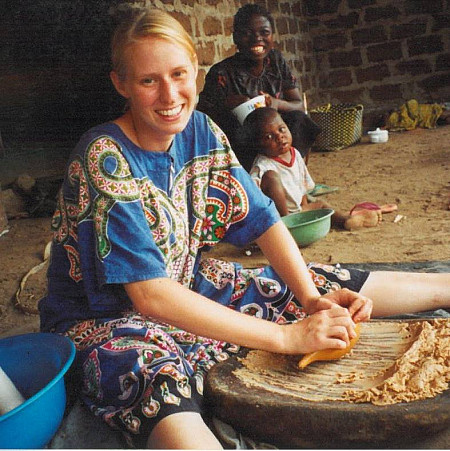
She adds that she also learned to appreciate the many privileges of living in a developed country and was consequently able to empathize with individuals from older generations. “You just take for granted that you can wash your hands before a meal. For me, to do that meant I had to go to a water pump, stand in line, get the water, come home, and either filter it or add some bleach—it’s a whole different paradigm. It really made me connect with my grandmother, because she had kind of gone through that growing up on farm in southern Illinois,” she remembers. “It was eye-opening. You appreciate what you have once you’ve gained perspective about it.”
Of course, beyond the many benefits she reaped during her service abroad, after her return to the U.S., Gannon confirmed that she had made the right decision choosing the Peace Corps over Arthur Andersen: the accounting firm had met its demise in August 2002 after revelations about its much-publicized complicity in the Enron scandal. Instead of having to endure the massive layoffs and a hurried job search after two years of menial desk work, Gannon leveraged her professional connections to become a regional recruiter—and later, a recruitment coordinator—for the Peace Corps. She spent seven years working for the agency before becoming a recruitment manager for a network of charter schools and then a physician recruiter for Baylor Scott & White Health, the largest nonprofit healthcare system in Texas. Today, she is a physician recruitment manager for HCA Healthcare’s Physician Services Group; as our interview came to an end, she was preparing to meet a neurosurgeon who specializes in implanting a particular kind of brain stent.

Given her adventures at Southwestern, in the Peace Corps, and throughout her career, it’s no surprise that the Southwestern alum believes that seeking experiences beyond what we find easy, comfortable, or familiar is the key to success. “Go to that meeting. Check out that group. Be open to new opportunities, like Greek life or a service organization,” Gannon advises. “Do whatever it is that gives you a different perspective, and be open to people who are different from you. Figure out how to give yourself those opportunities so that you can really understand what you believe in and why.” In other words, she summarizes, “Just say yes.”








